Exxon Valdez in Court
Air Date: Week of February 29, 2008
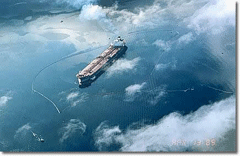
On March 24, 1989, the oil tanker Exxon Valdez ran aground in Alaska's Prince William Sound, spilling 11 million gallons of oil. (Photo: Alaska State Archives)
Exxon-Mobil refuses to pay two and a half billion dollar in punitive damages to Alaskan residents affected by the tragic oil spill that happened 18 years ago. Both sides of the court case say it’s not about the money. Living on Earth host Steve Curwood speaks with Travis Vlasoff, a plaintiff in the case from Tatitlek, Alaska and Jennifer Gibbins, the soundkeeper of Prince William’s Sound. We also hear from Ken Cohen, vice president of public affairs for Exxon-Mobil.
Transcript
CURWOOD: It’s Living on Earth, I’m Steve Curwood. Nearly two decades have passed but people in Alaska haven’t forgotten the environmental catastrophe that struck one March night in Prince William Sound.
[MEN SPEAKING OVER RADIO]
CURWOOD: It began with a midnight message to the Coast Guard from the oil tanker Exxon Valdez. The voice on Ship-to-Shore Radio was Captain Joseph Hazlewood.
[HAZLEWOOD SAYS INTO RADIO ‘IT’S VALDEZ BACK.’ HE SIGHS AND SAYS ‘WE’VE FETCHED UP HARD AGROUND’]
CURWOOD: 'We’ve fetched up hard aground,' the captain said. His supertanker was stranded, bleeding oil into the sea.
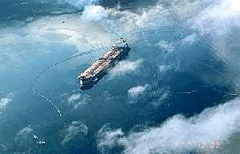
On March 24, 1989, the oil tanker Exxon Valdez ran aground in Alaska's Prince William Sound, spilling 11 million gallons of oil. (Photo: Alaska State Archives)
CURWOOD: On March 24th, 1989, the Exxon Valdez veered outside normal shipping lanes to avoid icebergs. It was night, but the tanker continued at full speed ahead. The ship hit a reef, ripping a half dozen holes in the hull.
LAWN: It’s hard to describe the wall of death that came out from underneath the ship and spread across the sound and killed almost every living creature that it touched.
CURWOOD: Dan Lawn of the Alaska Department of Environmental Conservation was among the first to respond. He videotaped the ship from a small boat, describing what he saw.
LAWN (on videotape): We’re approaching the Exxon Valdez. She’s hard aground.
LAWN: When we got next to the ship, our boat was floating in oil. There was a wave of oil coming out from underneath the ship that was approximately two or three feet higher than the surface- the liquid around it.
LAWN (on videotape): We’re looking at the hull of the ship. You can see a black oil line right here.
LAWN: The smells were- it was kind of like having your nose in the gas tank of your car.
[NEWSCASTER REPORTS ‘THE PORT OF VALDEZ HAS BEEN CLOSED AS THE RESULT OF A MASSIVE OIL SPILL BY AN EXXON TANKER . . . ’]
CURWOOD: News of the accident broke on local radio. It was the biggest spill ever in American waters. The official estimate: 11 million gallons of oil.
MAN: I want to assure everyone that Exxon is mobilizing all available resources to mitigate the impact from this incident. Exxon has assumed full financial responsibility for the incident.
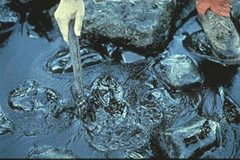
Pools of oil that leaked from the Exxon Valdez on a rocky beach in Alaska. (Courtesy of NOAA)
Still, Exxon Mobil is fighting punitive damages. An appeals court has already cut the amount awarded by a jury to two and half billion dollars and now Exxon Mobil is asking the U.S. Supreme Court to throw out that award altogether.
Many Alaskans are adamant that Exxon should be punished. They say Alaska is still reeling from the fouling of 1,200 miles of prime coastline while Exxon is making record profits. Travis Vlasoff is a Native Alaskan from the village of Tatitlek.
VLASOFF: There was a- just a great volume of oil. It’s hard to really convey how much oil there was. It was very, very thick on top of the water. Initially several feet thick. And there was just an incredible amount of wildlife and was either covered in it or obviously, you know, not the best of shape or already passed away.
CURWOOD: What did it smell like?
VLASOFF: It smelled like chemicals. It gave a good amount of the initial responders nose bleeds- just a horrible substance.
CURWOOD: Back in 1999, Living on Earth visited Cordova and we spoke with some of the men and women who fished there. I’d like to play you what Sheelagh and Ross Mullins had to say.
SHEELAGH: My permit was worth $150,000. I couldn’t sell it today. You know, where does that leave me? That was my pension, my retirement.
ROSS: The people that are here, a lot of them have seen some real serious economic consequences. You can’t say it’s 100 percent entirely devoted as a result of the spill but I would say at least 50 to 75 percent of it is. So, there’s a lot of angry people in this community still.
CURWOOD: So Travis, eight years on what’s the situation in your village?
VLASOFF: The village is still severely economically depressed. The community still has a lot of concern over the quantity and most definitely the quality of their subsistence foods. I would add that my father is a commercial fisherman and in response to what you just played me, the people who are continuing to fish and fished through the worst years following the spill did so because they were dedicated to that lifestyle and dedicated to their tradition of fishing. And it’s taken a lot of work to transform that into a continuing occupation.
CURWOOD: Over time of course they’ve reduced the punitive awards to Exxon. Now they argue that they’ve already paid billions of dollars to clean up and compensate people who fish and other Alaskans and they owe no more they say. What do you say to that?
VLASOFF: I’d like to read you something from the late chief of the native village of Port Graham, Walter McGannick. In his speech, “Coping with the Time When the Water Died” he addresses the cleanup that Exxon references repeatedly. And Walter says ‘the oil companies lied about preventing a spill. Now they lie about the cleanup. Our people know what happened on the beach. Spend all day cleaning one huge rock and the tide comes in and covers it in oil again. Spend a week wiping and spraying the surface but pick up a rock and there’s four inches of oil underneath.’
I witnessed this personally. My father and I were among the first people to visit a beach that had been cleaned. And there was an incredible amount of oil, just under the surface. We laid back in the sand, very excited for the clean beach, and we were horrified to see that we were entirely covered in oil when we stood up.
CURWOOD: Travis Vlasoff is a Native Alaskan and part of the class action lawsuit against Exxon. Thank you so much, Travis.
VLASOFF: Thank you.
CURWOOD: We turn now to Jennifer Gibbons. She’s executive director of Prince Williams Soundkeeper. Ms. Gibbons, as keeper of the Sound, what kind of state is it in now?
GIBBONS: Well I would say generally the sound is in good condition. It’s been recovering since the oil spill. The spill affected different aspects of the environment in different ways. So, for example, the herring stock, which is a keystone environmental species and also a keystone economic species for the fishery, crashed as a result of the spill and has not recovered. The marine mammals and the birds, they’re populations have been significantly affected, although some are doing better than others. So it’s kind of a mixed bag. Generally speaking, the sound is recovering slowly but there are still lasting and serious impacts to be dealt with.
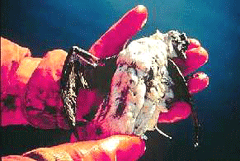
A volunteer in the 1989 clean-up handles an oil-soaked bird following the Exxon Valdez spill. (Photo: Alaska State Archives)
LANGE: The last time I tried fishing herring, we worked for over 22 days straight and we lost money. But that wasn’t the sad part. What was sad was returning to these bays, which used to be so full of life, and instead of seeing maybe 50, 60 pods of sea lions, I would be seeing maybe one. Instead of seeing whales everywhere, I would see none. Instead of seeing the bay boil with herring, I’d see a few herring here and there. And because the herring weren’t there, the birds weren’t there.
CURWOOD: So, these species that took a hit that you pointed out, back then they took obviously a very serious hit. What improvement, if any, from 1999?
GIBBONS: Well Sylvia’s a good friend and an amazing fisherwoman and she’s referring to exactly some of the things I was mentioning. The herring took such a large hit at that time that the biomass was significantly affected and the result of that is that the population has not really recovered to a sustainable level and of course that then, as Sylvia’s mentioning, has implications for the species that depend on it. And it’s true you do hear you know, fishermen and native people who have known the sound for a long time, they talk about some of the things that Sylvia’s mentioning- places that used to be vibrant with not only life but the sound of life are significantly different.
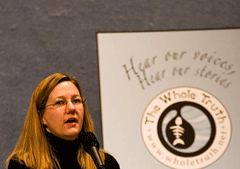
Jennifer Gibbons, Executive Director, Prince William Soundkeeper. (Photo: Dakote Fine)
GIBBONS: Well, all aspects of the community are still suffering from the corrosive effects of 19 years of litigation and you know, recovery. The communities are functioning differently. I think, speaking with Travis, you know, talking about what happened in the village with Tatitlek. Their whole lifestyle has been permanently altered and so they’re struggling to deal with that and find new ways, new economic opportunities to sustain their community. When you talk about a community like Cordova, that’s a fishing community, it’s a very simple, rustic, hard-working place, and you can see the economic impact. When you talk to the fisherman, every year it’s so important for them to break even in what they’re doing. Getting beyond that is secondary but they’ve got to break even to keep going.
CURWOOD: Exxon says that it’s made the Sound whole, that the environment is cleaned up, it shouldn’t be punished. You’re laughing.
GIBBONS: I’m definitely laughing at Exxon. They’re statements are simply offensive and they’re offensive to Alaskans and they’re offensive to all Americans. Exxon is banking on the fact that people have forgotten and punitive damages are intended as punishment and deterrents. But the bottom line is, for these people, it’s not about the money. It’s about justice. And it’s about holding Exxon accountable and it’s about the fact that they did the crime- they need to do the time. And in this case, the time is paying the punitive damages. They don’t want to pay it because they don’t want to be responsible in the future. And that’s why this case, it’s not just about Alaskans and 1989. It’s about the future of protecting clean water across the United States.
CURWOOD: Thank you, Jennifer Gibbons. You’re the executive director of Prince William Soundkeeper.
GIBBONS: Thank you very much.
CURWOOD: Joining me now is Ken Cohen, on the line from Dallas, Texas. He’s the vice president of public affairs for ExxonMobile. Hello, sir.
COHEN: Hello.
CURWOOD: Now, when I asked Jennifer Gibbons, who’s the Prince Williams Soundkeeper about your company’s claim that it has made Prince William Sound whole, she- well, she literally laughed.
COHEN: Well, I’m surprised and it’s unfortunate that that was the response. The fact is we accepted responsibility immediately for the accident and we did the only thing we could do at the time, which was to put our people and our money to work to clean it up. And we have spent three and a half billion dollars over the years in restoring the Sound, and cleaning up the cost, and compensating individuals for their economic losses. Now the fact is that when an oil spill occurs, particularly one of the size of the Valdez, it is a traumatic event. But over time, first with the cleanup we did, and then as nature takes its course, the Sound recovers.
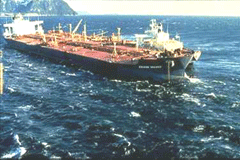
Exxon Valdez grounded on Bligh Reef. (Courtesy of NOAA)
COHEN: You know, I’m glad actually that the question was put that way because what company, having gone through what our company has gone through- first just the trauma of going through the incident, accepting responsibility, paying the billions and billions in cleanup costs, and now of course dealing with the question of whether punitive damages would be appropriate in this case- what company believes that they’ve gotten away with something? Our company has been put through the ringer. And it’s significant for ExxonMobil and it’s also significant for all companies and businesses that operate here in the U.S.
You know, we live in a very litigious society and trial lawyers in any case, of any consequence, now as a matter of routine, ask the court to award punitive damages and we’re pleased now that the Supreme Court has another opportunity to provide guidance to the judicial system in the U.S. and to those situations when it really is appropriate to make that rare award of punitive damages.
CURWOOD: So how much have you paid in terms of punishment so far, you say you’ve already paid-
COHEN: We’ve paid three and a half billion dollars in the form of fines and penalties and cleanup costs.
CURWOOD: Okay, take out the cleanup costs- setting things right. And what have you paid in terms of the punitive side of this?
COHEN: I would lump- I don’t know how you can separate. These are all punishments in terms of- remember we also had a U.S. Attorney’s Office-
CURWOOD: I’m sorry I don’t mean to be rude here but let’s be clear. You say that there are criminal sanctions here, so there have been criminal penalties.
COHEN: We’ve paid the largest criminal fine to date for an environmental violation. The criminal fines with the U.S. federal government and the state government were over $125 million dollars.
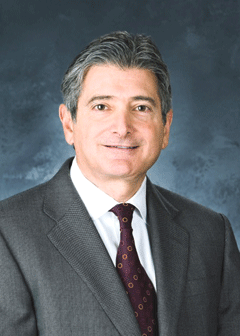
Ken Cohen is the Vice President of Public Affairs at Exxon Mobil Corporation (Photo: Exxon Mobil Corporation)
COHEN: Those are not the facts of our case.
CURWOOD: Well you had a drunk driver vanish from the wheel of your Exxon Valdez, I think that there is I think some parallels here.
COHEN: Well, again, I would argue, and my view certainly is that this instance we had a tragic accident for one we’ve taken or accepted responsibility. We’ve done everything in our power to cleanup the consequences of the spill. We believe that the three and a half billion dollars in cleanup costs, compensation and fines and penalties that we’ve paid up to this point- those are the facts of the case. That’s what we’re dealing with.
CURWOOD: Speaking about money and Exxon’s earnings and profits. If you were to pay the two and a half billion dollars, it would seem that you could well afford this. It would be what, about a fifth of your last quarter’s profits. Given the kind of public relations question that this raises about your company, why wouldn’t it make sense just to pay up and put this behind you?
COHEN: This is not a question of having the financial wherewithal to pay. The question is ‘is this an appropriate case, an appropriate instance for which punitive damages should be awarded?’ And our position is ‘no.’
CURWOOD: Ken Cohen is vice president of public affairs for ExxonMobil. Thank you so much, sir.
COHEN: Thank you.
[MUSIC: Anat Fort “Just Now.Var 1” from A Long Story (ECM Records 2007)]
CURWOOD: More than 33,000 people and businesses are plaintiffs in the lawsuit, which means they would get about $75,000 each, if the Supreme Court rejects Exxon’s appeal and lets the punitive damage award stand. The high court ruling is expected in a few months.
Links
National Oceanic and Atmospheric Administration "Spotlight" on the Exxon Valdez
Living on Earth wants to hear from you!
Living on Earth
62 Calef Highway, Suite 212
Lee, NH 03861
Telephone: 617-287-4121
E-mail: comments@loe.org
Newsletter [Click here]
Donate to Living on Earth!
Living on Earth is an independent media program and relies entirely on contributions from listeners and institutions supporting public service. Please donate now to preserve an independent environmental voice.
NewsletterLiving on Earth offers a weekly delivery of the show's rundown to your mailbox. Sign up for our newsletter today!
 Sailors For The Sea: Be the change you want to sea.
Sailors For The Sea: Be the change you want to sea.
 The Grantham Foundation for the Protection of the Environment: Committed to protecting and improving the health of the global environment.
The Grantham Foundation for the Protection of the Environment: Committed to protecting and improving the health of the global environment.
 Contribute to Living on Earth and receive, as our gift to you, an archival print of one of Mark Seth Lender's extraordinary wildlife photographs. Follow the link to see Mark's current collection of photographs.
Contribute to Living on Earth and receive, as our gift to you, an archival print of one of Mark Seth Lender's extraordinary wildlife photographs. Follow the link to see Mark's current collection of photographs.
 Buy a signed copy of Mark Seth Lender's book Smeagull the Seagull & support Living on Earth
Buy a signed copy of Mark Seth Lender's book Smeagull the Seagull & support Living on Earth

